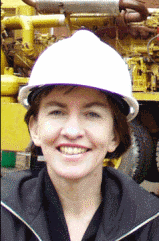|
|
|
|
|
|
|
News & Views item - March 2009 |
![]() New
South Wales Chief Scientist &Scientific Engineer Has a Word Regarding Climate
Change. (March 31, 2009)
New
South Wales Chief Scientist &Scientific Engineer Has a Word Regarding Climate
Change. (March 31, 2009)
Last Friday Professor Mary O'Kane, New South Wales Chief Scientist and Scientific Engineer spoke to the state division of Engineers Australia but the heart of her talk was really addressed to the population at large.
Some excerpts:
 In
tackling climate change everyone needs to remember (not just us) it is not going
to be solved without engineering.
In
tackling climate change everyone needs to remember (not just us) it is not going
to be solved without engineering.
I believe that we need to move to an approach to engineering
characterised by 3 things that are different.
1) moving from engineering where we attempt to predict risks and design to
deal with them to putting a great deal more emphasis on accepting that we need
to design for:
risks we haven't anticipated
rapid obsolescence of technology.
This means with everything we construct we would need to have a
deconstruction and disposal plan; and a plan for how we'd strip out parts and
replace them. We would be mitigating risk by deconstruction techniques – where
will it fail first?
2) I also believe that we need to have a much more sophisticated
understanding of how our engineering contributions fit in to our economy
short-term and long-term. Just as we produce design statements and risk
statements; I believe it should become routine that engineers produce economic
and social impact statements (as well as environmental).
3) we also need to make sure that the decision-makers, the community at large understand the difference between scientific discovery and the scaling up and the scaling down of such scientific effects through engineering to produce new structures in new devices and services. Just because something has been demonstrated in a laboratory or because a model has suggested a series of results, this does not mean that the translation of these results into usable structures and artefacts is straightforward or even possible.
Professor O'Kane goes on to quote MIT's Richard Lester, director of its Industrial Performance Center: "...in case there is any doubt…, the underlying issue here is growing demand," and Ross Garnaut: "Australia has a strong national interest in ... the development of competitive, large-scale renewables and carbon capture and storage... National economic performance will be related closely to how well an economy adjusts to changes in costs and opportunities associated with carbon pricing and emissions-related technological change."
In her view: "[We]
will need an excellent understanding of the economics of energy and power; we
will need to make sure we have continually evolving models of the interaction of
human generated energy sources and the environment. And we will need to ensure
that every scientific discovery is not hailed as an immediate and fast fix to
energy problems [and] make sure that the public feels confident that engineers
are across the science and able to assess and make use of it as quickly as
possible.